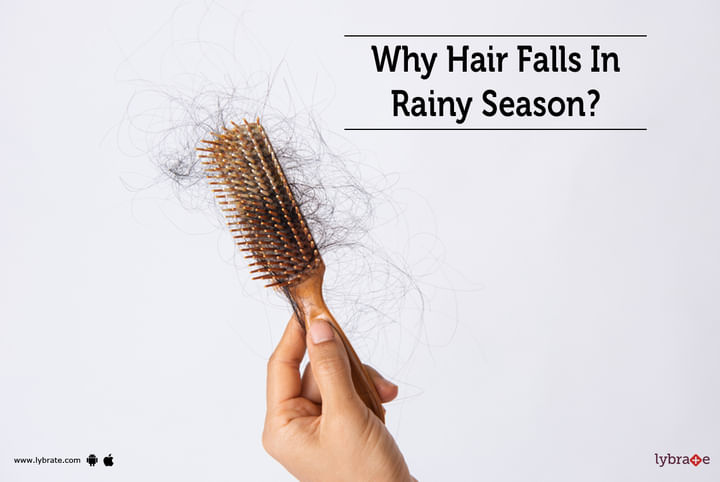Why Hair Falls In Rainy Season?
Your hair may fall quite rapidly in the rainy season. This is mainly owing to your hair's exposure to high humidity, dirty rainwater, or acid rain. The aforementioned factors can make your hair so dry and brittle that it ends up becoming prone to breakage.
It should also be noted that even exposure to dirt and sweat can make your hair easily fall out. One of the best ways to avoid hair loss during such seasons is by letting your hair dry naturally after every wash. However, a hair dryer with heat protection can also be a great option when it comes to drying your hair.
A hair conditioner or hair oil is also recommended for anyone who wants stronger hair. The idea is to keep the hair moisturized so that it does not tend to break easily.
In fact, deep conditioning is one of the best ways to deal with dry hair as well. If you have dry hair, deep conditioning will make it soft and shiny.
Furthermore, we bring you some of the best tips and ideas that can help prevent rapid hair loss during the rainy season. If you are also among those folks who are fed up with excessive hair loss during the monsoon season, you must go through the following information very carefully:
Try Keeping Your Hair Clean and Dry
- Weather is a major factor in the everyday lives of many of us. No matter in which part of the world we live, we are indiscriminately affected by the weather or climatic conditions. While some are lucky enough to live in regions free from extreme weather, most of us have to cope with rain, dust, heat and other weather extremes.
- Excessive or rapid hair loss is mostly the result of such harsh weather conditions. During the rainy season, a lot of people suffer from hair loss. This is some kind of a fact that many of us are not aware of. However, there are a number of precautions that can be taken to avoid your scalp turning into a disaster area.
- One of these precautions is to keep the hair clean and dry. What usually happens is that while we enjoy the monsoon season, we often neglect our hair. This is why hair breakage and excessive hair loss are way too common during the monsoon season.
- Hair tends to shed a lot during the monsoon season, especially if you do not take care of it properly. So, if you want to get rid of monsoonal hair loss, you must always wash your hair properly and dry it well during the rainy season. Experts believe it to be one of the best natural ways to help prevent excessive hair loss during the monsoons.
Use A Mild Shampoo
- Hair loss is a common problem, and although it has its own treatment through some medications and hair transplant surgeries, natural remedies are always preferred. Hair loss during the monsoon is also a common phenomenon. This mainly happens because the rainy season brings a lot of dust, air pollution, excessive cold and other changes in the weather.
- This makes your hair fall more frequently. Hair loss is excessive in extreme conditions. But if you are using a mild shampoo on an everyday basis, then you can definitely reduce or control your hair fall.
- Using mild shampoos is a great way to keep your hair from falling during the rainy season. Mild or natural shampoos are ideal for hair growth and to prevent gray hair as well.
- We already know that hair fall during monsoons is very common, especially in people who have dry and frizzy hair. However, using a mild shampoo or one made from natural ingredients, you can fight hair fall to a great extent.
Dry Your Hair Well Before Tying It Up
- While it might seem like a harmless practice, there are many people out there who don't know that tying wet hair can be very harmful. If you tie your wet hair and leave it for a long time, it can lead to excessive hair loss and even permanent damage to your hair at times.
- Especially during the monsoons, when hairfall becomes commonplace, it is very important to check our hair on an everyday basis. Many of us usually tie our wet hair and let it dry, with the expectation that we are protecting the hair.
- However, it is a totally false assumption. When you tie your hair without properly drying it, it gets entangled with itself. The excessive pressure then results in breakage.
- The best way to dry your hair after washing is naturally or on its own. However, a hair dryer with heat protection can also be a good, and most importantly, harmless, option to dry your hair before tying it up.
Drink Plenty of Water
From the time of our forefathers, we have been hearing about the importance of drinking enough water. But it still happens during the summer or monsoon that we tend to forget about this basic fact and end up being dehydrated, which may lead to excessive hair loss. You must know that keeping yourself hydrated can help prevent any kind of hair loss, be it the kind that is triggered during the monsoon season. So, if you want to get rid of excessive hair loss, especially during the monsoons, you must realize the importance of water or hydration.
Conclusion
- The rainy season brings air with a high relative humidity, and the hair is exposed to a lot of negative factors. Tying your hair up in a ponytail or a bun after drying it during the rainy season is a great way to prevent hair loss.
- You can also try wearing a waterproof hat or a beanie during the rain to protect your hair from dirty water and pollution. To give your hair a healthy shine, you can use a hydrating shampoo and a hydrating conditioner.
- Furthermore, we hope that you find all the information given in this article useful and beneficial. Please feel free to write to us at any time if you have any queries regarding the same subject.



+1.svg)
